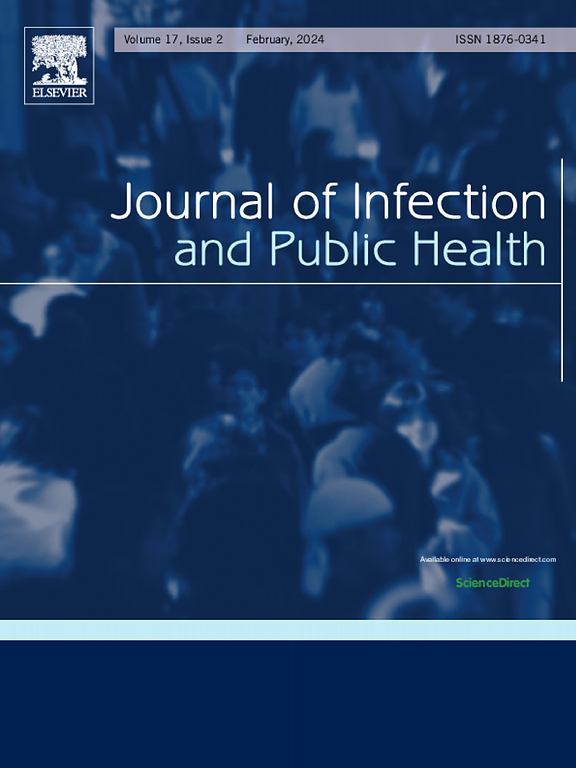Strengthening global health security through antimicrobial resistance control: Insights from Saudi Arabia
IF 4.7
3区 医学
Q1 INFECTIOUS DISEASES
引用次数: 0
Abstract
Antimicrobial resistance (AMR) poses a significant threat to global health security, and Saudi Arabia plays a key role in addressing this challenge. This review highlights Saudi Arabia’s National Action Plan, which focuses on improving data collection, monitoring AMR trends, and promoting the responsible use of antimicrobials in human and veterinary medicine. While the Kingdom has shown leadership in regional AMR control efforts, recent data indicate rising resistance rates among key pathogens, including methicillin-resistant Staphylococcus aureus and carbapenem-resistant Klebsiella pneumoniae, posing a growing public health concern. Additionally, gaps in AMR surveillance persist, particularly in rural and underserved regions, limiting comprehensive resistance tracking. Efforts to address AMR have included nationwide antibiotic stewardship programs, legal reforms restricting over-the-counter antibiotic sales, and enhanced public awareness campaigns, but challenges remain in ensuring sustained implementation and compliance across all healthcare and agricultural sectors. Strengthening surveillance systems, increasing public awareness, and fostering international collaborations are crucial to managing AMR within Saudi Arabia and mitigating its global impact.
通过控制抗微生物药物耐药性加强全球卫生安全:来自沙特阿拉伯的见解
抗微生物药物耐药性对全球卫生安全构成重大威胁,沙特阿拉伯在应对这一挑战方面发挥着关键作用。本综述重点介绍了沙特阿拉伯的《国家行动计划》,该计划侧重于改进数据收集、监测抗微生物药物耐药性趋势以及促进在人药和兽药中负责任地使用抗微生物药物。虽然沙特在区域抗微生物药物耐药性控制工作中发挥了领导作用,但最近的数据表明,主要病原体(包括耐甲氧西林金黄色葡萄球菌和耐碳青霉烯肺炎克雷伯菌)的耐药率正在上升,这引起了日益严重的公共卫生关注。此外,抗菌素耐药性监测方面的差距仍然存在,特别是在农村和服务不足地区,这限制了对耐药性的全面追踪。应对抗菌素耐药性的努力包括在全国范围内实施抗生素管理计划,进行限制非处方抗生素销售的法律改革,以及加强公众意识运动,但在确保所有医疗保健和农业部门的持续实施和合规方面仍然存在挑战。加强监测系统、提高公众意识和促进国际合作对于管理沙特阿拉伯境内的抗菌素耐药性和减轻其全球影响至关重要。
本文章由计算机程序翻译,如有差异,请以英文原文为准。
求助全文
约1分钟内获得全文
求助全文
来源期刊

Journal of Infection and Public Health
PUBLIC, ENVIRONMENTAL & OCCUPATIONAL HEALTH -INFECTIOUS DISEASES
CiteScore
13.10
自引率
1.50%
发文量
203
审稿时长
96 days
期刊介绍:
The Journal of Infection and Public Health, first official journal of the Saudi Arabian Ministry of National Guard Health Affairs, King Saud Bin Abdulaziz University for Health Sciences and the Saudi Association for Public Health, aims to be the foremost scientific, peer-reviewed journal encompassing infection prevention and control, microbiology, infectious diseases, public health and the application of healthcare epidemiology to the evaluation of health outcomes. The point of view of the journal is that infection and public health are closely intertwined and that advances in one area will have positive consequences on the other.
The journal will be useful to all health professionals who are partners in the management of patients with communicable diseases, keeping them up to date. The journal is proud to have an international and diverse editorial board that will assist and facilitate the publication of articles that reflect a global view on infection control and public health, as well as emphasizing our focus on supporting the needs of public health practitioners.
It is our aim to improve healthcare by reducing risk of infection and related adverse outcomes by critical review, selection, and dissemination of new and relevant information in the field of infection control, public health and infectious diseases in all healthcare settings and the community.
 求助内容:
求助内容: 应助结果提醒方式:
应助结果提醒方式:


